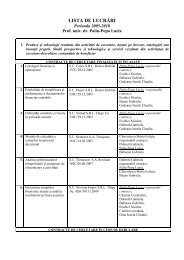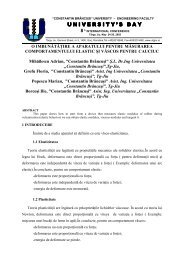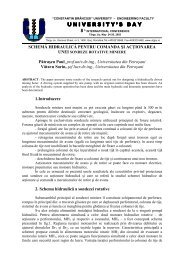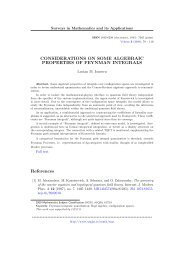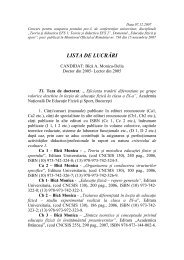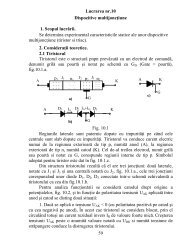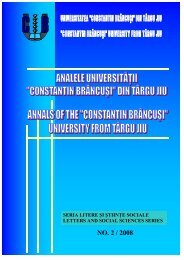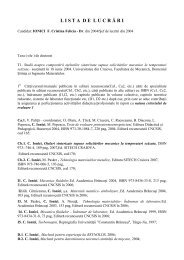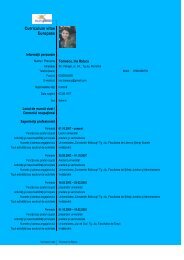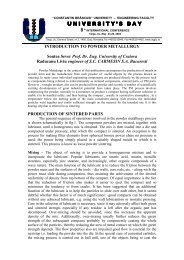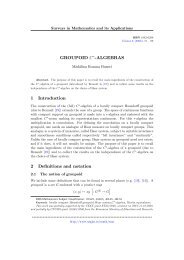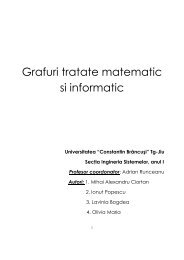- Page 1 and 2: Annals of the University “Constan
- Page 3 and 4: Annals of the University “Constan
- Page 5 and 6: Annals of the University “Constan
- Page 7 and 8: Annals of the University “Constan
- Page 9 and 10: Annals of the University “Constan
- Page 11 and 12: Annals of the University “Constan
- Page 13 and 14: Annals of the University “Constan
- Page 15 and 16: Annals of the University “Constan
- Page 17 and 18: Annals of the University “Constan
- Page 19 and 20: Annals of the University “Constan
- Page 21 and 22: Annals of the University “Constan
- Page 23 and 24: Annals of the University “Constan
- Page 25 and 26: Annals of the University “Constan
- Page 27 and 28: Annals of the University “Constan
- Page 29 and 30: Annals of the University “Constan
- Page 31: Annals of the University “Constan
- Page 35 and 36: Annals of the University “Constan
- Page 37 and 38: Annals of the University “Constan
- Page 39 and 40: Annals of the University “Constan
- Page 41 and 42: Annals of the University “Constan
- Page 43 and 44: Annals of the University “Constan
- Page 45 and 46: Annals of the University “Constan
- Page 47 and 48: Annals of the University “Constan
- Page 49 and 50: Annals of the University “Constan
- Page 51 and 52: Annals of the University “Constan
- Page 53 and 54: Annals of the University “Constan
- Page 55 and 56: Annals of the University “Constan
- Page 57 and 58: Annals of the University “Constan
- Page 59 and 60: Annals of the University “Constan
- Page 61 and 62: Annals of the University “Constan
- Page 63 and 64: Annals of the University “Constan
- Page 65 and 66: Annals of the University “Constan
- Page 67 and 68: Annals of the University “Constan
- Page 69 and 70: Annals of the University “Constan
- Page 71 and 72: Annals of the University “Constan
- Page 73 and 74: Annals of the University “Constan
- Page 75 and 76: Annals of the University “Constan
- Page 77 and 78: Annals of the University “Constan
- Page 79 and 80: Annals of the University “Constan
- Page 81 and 82: Annals of the University “Constan
- Page 83 and 84:
Annals of the University “Constan
- Page 85 and 86:
Annals of the University “Constan
- Page 87 and 88:
Annals of the University “Constan
- Page 89 and 90:
Annals of the University “Constan
- Page 91 and 92:
Annals of the University “Constan
- Page 93 and 94:
Annals of the University “Constan
- Page 95 and 96:
Annals of the University “Constan
- Page 97 and 98:
Fundamental qualities Annex qualiti
- Page 99 and 100:
Annals of the University “Constan
- Page 101 and 102:
Annals of the University “Constan
- Page 103 and 104:
Annals of the University “Constan
- Page 105 and 106:
Annals of the University “Constan
- Page 107 and 108:
Annals of the University “Constan
- Page 109 and 110:
Annals of the University “Constan
- Page 111 and 112:
Annals of the University “Constan
- Page 113 and 114:
Annals of the University “Constan
- Page 115 and 116:
Annals of the University “Constan
- Page 117 and 118:
Annals of the University “Constan
- Page 119 and 120:
Annals of the University “Constan
- Page 121 and 122:
Annals of the University “Constan
- Page 123 and 124:
Annals of the University “Constan
- Page 125 and 126:
Annals of the University “Constan
- Page 127 and 128:
Annals of the University “Constan
- Page 129 and 130:
Annals of the University “Constan
- Page 131 and 132:
Annals of the University “Constan
- Page 133 and 134:
Annals of the University “Constan
- Page 135 and 136:
Annals of the University “Constan
- Page 137 and 138:
Annals of the University “Constan
- Page 139 and 140:
Annals of the University “Constan
- Page 141 and 142:
Annals of the University “Constan
- Page 143 and 144:
Annals of the University “Constan
- Page 145 and 146:
Annals of the University “Constan
- Page 147 and 148:
Annals of the University “Constan
- Page 149 and 150:
Annals of the University “Constan
- Page 151 and 152:
Annals of the University “Constan
- Page 153 and 154:
Annals of the University “Constan
- Page 155 and 156:
Annals of the University “Constan
- Page 157 and 158:
Annals of the University “Constan
- Page 159 and 160:
Annals of the University “Constan
- Page 161 and 162:
Annals of the University “Constan
- Page 163 and 164:
Annals of the University “Constan
- Page 165 and 166:
Annals of the University “Constan
- Page 167 and 168:
Annals of the University “Constan
- Page 169 and 170:
Annals of the University “Constan
- Page 171 and 172:
Annals of the University “Constan
- Page 173 and 174:
Annals of the University “Constan
- Page 175 and 176:
Annals of the University “Constan
- Page 177 and 178:
Annals of the University “Constan
- Page 179 and 180:
Annals of the University “Constan
- Page 181 and 182:
Annals of the University “Constan
- Page 183 and 184:
Annals of the University “Constan
- Page 185 and 186:
Annals of the University “Constan
- Page 187 and 188:
Annals of the University “Constan
- Page 189 and 190:
Annals of the University “Constan
- Page 191 and 192:
Annals of the University “Constan
- Page 193 and 194:
Annals of the University “Constan
- Page 195 and 196:
Annals of the University “Constan
- Page 197 and 198:
Annals of the University “Constan
- Page 199 and 200:
Annals of the University “Constan
- Page 201 and 202:
Annals of the University “Constan
- Page 203 and 204:
Annals of the University “Constan
- Page 205 and 206:
Annals of the University “Constan
- Page 207 and 208:
1. Types of risk which have respond
- Page 209 and 210:
Annals of the University “Constan
- Page 211 and 212:
Annals of the University “Constan
- Page 213 and 214:
Annals of the University “Constan
- Page 215 and 216:
Annals of the University “Constan
- Page 217 and 218:
Annals of the University “Constan
- Page 219 and 220:
Annals of the University “Constan
- Page 221 and 222:
Annals of the University “Constan
- Page 223 and 224:
Annals of the University “Constan
- Page 225 and 226:
Annals of the University “Constan
- Page 227 and 228:
Annals of the University “Constan
- Page 229 and 230:
Annals of the University “Constan
- Page 231 and 232:
Annals of the University “Constan
- Page 233 and 234:
Annals of the University “Constan
- Page 235 and 236:
Annals of the University “Constan
- Page 237 and 238:
Annals of the University “Constan
- Page 239 and 240:
Annals of the University “Constan
- Page 241 and 242:
Annals of the University “Constan
- Page 243 and 244:
Annals of the University “Constan
- Page 245 and 246:
Annals of the University “Constan
- Page 247 and 248:
Annals of the University “Constan
- Page 249 and 250:
Annals of the University “Constan
- Page 251 and 252:
Annals of the University “Constan
- Page 253 and 254:
Annals of the University “Constan
- Page 255 and 256:
Annals of the University “Constan
- Page 257 and 258:
Annals of the University “Constan
- Page 259 and 260:
Annals of the University “Constan
- Page 261 and 262:
Annals of the University “Constan
- Page 263 and 264:
Annals of the University “Constan
- Page 265 and 266:
Annals of the University “Constan
- Page 267 and 268:
Annals of the University “Constan
- Page 269 and 270:
Annals of the University “Constan
- Page 271 and 272:
Annals of the University “Constan
- Page 273 and 274:
Annals of the University “Constan
- Page 275 and 276:
Annals of the University “Constan
- Page 277 and 278:
Annals of the University “Constan
- Page 279 and 280:
Annals of the University “Constan
- Page 281 and 282:
Annals of the University “Constan
- Page 283 and 284:
Annals of the University “Constan
- Page 285 and 286:
Annals of the University “Constan
- Page 287 and 288:
Annals of the University “Constan
- Page 289 and 290:
Annals of the University “Constan
- Page 291 and 292:
Annals of the University “Constan
- Page 293 and 294:
Annals of the University “Constan
- Page 295 and 296:
Annals of the University “Constan
- Page 297 and 298:
Annals of the University “Constan
- Page 299 and 300:
Annals of the University “Constan
- Page 301 and 302:
Annals of the University “Constan
- Page 303 and 304:
Annals of the University “Constan
- Page 305 and 306:
Annals of the University “Constan
- Page 307 and 308:
Annals of the University “Constan
- Page 309 and 310:
Annals of the University “Constan
- Page 311 and 312:
Annals of the University “Constan
- Page 313 and 314:
Annals of the University “Constan
- Page 315 and 316:
Annals of the University “Constan
- Page 317 and 318:
Annals of the University “Constan
- Page 319 and 320:
Annals of the University “Constan
- Page 321 and 322:
Annals of the University “Constan
- Page 323 and 324:
Annals of the University “Constan
- Page 325 and 326:
Annals of the University “Constan
- Page 327 and 328:
Annals of the University “Constan
- Page 329 and 330:
Annals of the University “Constan
- Page 331 and 332:
Annals of the University “Constan
- Page 333 and 334:
Annals of the University “Constan
- Page 335 and 336:
Annals of the University “Constan
- Page 337 and 338:
Annals of the University “Constan
- Page 339 and 340:
Annals of the University “Constan
- Page 341 and 342:
Annals of the University “Constan
- Page 343 and 344:
Annals of the University “Constan
- Page 345 and 346:
Annals of the University “Constan
- Page 347 and 348:
Annals of the University “Constan
- Page 349 and 350:
Annals of the University “Constan
- Page 351 and 352:
Annals of the University “Constan
- Page 353 and 354:
Annals of the University “Constan
- Page 355 and 356:
Annals of the University “Constan
- Page 357 and 358:
Annals of the University “Constan
- Page 359 and 360:
Annals of the University “Constan
- Page 361 and 362:
Annals of the University “Constan
- Page 363 and 364:
Annals of the University “Constan
- Page 365 and 366:
Annals of the University “Constan
- Page 367 and 368:
Annals of the University “Constan
- Page 369 and 370:
Annals of the University “Constan
- Page 371 and 372:
Annals of the University “Constan
- Page 373 and 374:
Annals of the University “Constan
- Page 375 and 376:
Annals of the University “Constan
- Page 377 and 378:
Annals of the University “Constan
- Page 379 and 380:
Annals of the University “Constan
- Page 381 and 382:
Annals of the University “Constan
- Page 383 and 384:
Annals of the University “Constan
- Page 385 and 386:
Annals of the University “Constan
- Page 387 and 388:
Annals of the University “Constan
- Page 389 and 390:
Annals of the University “Constan
- Page 391 and 392:
Annals of the University “Constan
- Page 393 and 394:
Annals of the University “Constan
- Page 395 and 396:
Annals of the University “Constan
- Page 397 and 398:
Annals of the University “Constan
- Page 399 and 400:
Annals of the University “Constan
- Page 401 and 402:
Annals of the University “Constan
- Page 403 and 404:
Annals of the University “Constan
- Page 405 and 406:
Annals of the University “Constan
- Page 407 and 408:
Annals of the University “Constan
- Page 409 and 410:
Annals of the University “Constan
- Page 411 and 412:
Annals of the University “Constan
- Page 413 and 414:
Annals of the University “Constan
- Page 415 and 416:
Annals of the University “Constan
- Page 417 and 418:
Annals of the University “Constan
- Page 419 and 420:
Annals of the University “Constan
- Page 421 and 422:
Annals of the University “Constan
- Page 423 and 424:
Annals of the University “Constan
- Page 425 and 426:
Annals of the University “Constan
- Page 427 and 428:
Annals of the University “Constan
- Page 429 and 430:
Annals of the University “Constan
- Page 431 and 432:
Annals of the University “Constan
- Page 433 and 434:
Annals of the University “Constan
- Page 435 and 436:
Annals of the University “Constan
- Page 437 and 438:
Annals of the University “Constan
- Page 439 and 440:
Annals of the University “Constan
- Page 441 and 442:
Annals of the University “Constan
- Page 443 and 444:
Annals of the University “Constan
- Page 445 and 446:
Annals of the University “Constan
- Page 447 and 448:
Annals of the University “Constan
- Page 449 and 450:
Annals of the University “Constan
- Page 451 and 452:
Annals of the University “Constan
- Page 453 and 454:
Annals of the University “Constan
- Page 455 and 456:
Annals of the University “Constan
- Page 457 and 458:
Annals of the University “Constan
- Page 459 and 460:
Annals of the University “Constan
- Page 461 and 462:
Annals of the University “Constan
- Page 463 and 464:
Annals of the University “Constan
- Page 465 and 466:
Annals of the University “Constan
- Page 467 and 468:
Annals of the University “Constan
- Page 469 and 470:
Annals of the University “Constan
- Page 471 and 472:
Annals of the University “Constan
- Page 473 and 474:
Annals of the University “Constan
- Page 475 and 476:
Annals of the University “Constan
- Page 477 and 478:
Annals of the University “Constan
- Page 479 and 480:
Annals of the University “Constan
- Page 481 and 482:
The great companies can choose eith
- Page 483 and 484:
Annals of the University “Constan
- Page 485 and 486:
Annals of the University “Constan
- Page 487 and 488:
Annals of the University “Constan
- Page 489 and 490:
Annals of the University “Constan
- Page 491 and 492:
Annals of the University “Constan
- Page 493 and 494:
Annals of the University “Constan
- Page 495 and 496:
Annals of the University “Constan
- Page 497 and 498:
Annals of the University “Constan
- Page 499 and 500:
Annals of the University “Constan
- Page 501 and 502:
Annals of the University “Constan
- Page 503 and 504:
Annals of the University “Constan
- Page 505 and 506:
Annals of the University “Constan
- Page 507 and 508:
Annals of the University “Constan
- Page 509 and 510:
Annals of the University “Constan
- Page 511 and 512:
Annals of the University “Constan
- Page 513 and 514:
Annals of the University “Constan
- Page 515 and 516:
Annals of the University “Constan
- Page 517 and 518:
Annals of the University “Constan
- Page 519 and 520:
Annals of the University “Constan
- Page 521 and 522:
Annals of the University “Constan
- Page 523 and 524:
Annals of the University “Constan
- Page 525 and 526:
Annals of the University “Constan
- Page 527 and 528:
Annals of the University “Constan
- Page 529 and 530:
Annals of the University “Constan
- Page 531 and 532:
Annals of the University “Constan
- Page 533 and 534:
Annals of the University “Constan
- Page 535 and 536:
Annals of the University “Constan
- Page 537:
Annals of the University “Constan



